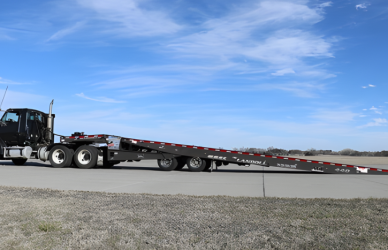This week marks National Relaxation Day, a perfect time for truckers to focus on self-care and relaxation. Long hours on the road can be incredibly taxing both mentally and physically, making it essential to find ways to unwind and recharge. Whether you’re navigating cross-country routes or managing local deliveries, prioritizing relaxation can significantly impact your well-being and performance. In this blog, we’ll explore effective relaxation techniques specifically tailored for truckers, helping you stay refreshed and rejuvenated on the road.
- Prioritize Quality Sleep
Why It Matters: According to the National Sleep Foundation, sleep is essential for overall health and well-being. For truckers, quality sleep is particularly crucial due to the demanding nature of the job.
Tips for Better Sleep:
- Create a Restful Environment: Invest in a comfortable mattress and pillows for your truck’s sleeper berth. Use blackout curtains to block out light and reduce noise with earplugs or white noise machines.
- Stick to a Routine: Try to maintain a consistent sleep schedule, even when your routes change. This helps regulate your internal clock and improves sleep quality.
- Practice Deep Breathing Exercises
Why It Matters: Deep breathing exercises help reduce stress and anxiety by calming the nervous system. The American Heart Association emphasizes that controlled breathing can lower blood pressure and heart rate, which are often elevated during stressful periods.
How to Practice:
- Find a Quiet Spot: While waiting at a rest stop or during a break, take a few minutes to sit quietly.
- Breathe Deeply: Inhale slowly through your nose for a count of four, hold for a count of four, and exhale through your mouth for a count of four. Repeat this process for 5-10 minutes to help calm your mind and body.
- Incorporate Stretching and Exercise
Why It Matters: Sitting for prolonged periods can lead to stiffness and discomfort. The American College of Sports Medicine suggests that regular stretching and exercise can improve circulation and reduce muscle tension.
Stretching Routine:
- Neck Stretches: Gently tilt your head towards each shoulder to stretch your neck muscles.
- Back Stretch: While seated, twist your torso gently to one side and then the other.
- Leg Stretch: Stand up and stretch your legs by reaching towards your toes or using a wall for support.
Quick Exercises:
- Walking: Take a brisk walk around the truck stop or parking area to get your blood flowing.
- Bodyweight Exercises: Simple exercises like squats and lunges can be done in your truck’s space or during breaks.
- Stay Hydrated and Eat Nutritious Foods
Why It Matters: Proper hydration and nutrition are essential for maintaining energy levels and overall health. The Centers for Disease Control and Prevention (CDC) highlights that hydration helps prevent fatigue and improves cognitive function.
Hydration Tips:
- Carry Water: Always have a water bottle handy and aim to drink at least 8 cups of water a day.
- Avoid Caffeine: Limit caffeine intake, as it can lead to dehydration and affect your sleep.
Healthy Eating Tips:
- Snack Wisely: Opt for nutritious snacks like fruits, nuts, and yogurt instead of processed foods.
- Plan Meals: Prepare healthy meals in advance or choose balanced options from truck stop diners.
- Engage in Mindfulness and Meditation
Why It Matters: Mindfulness and meditation are proven techniques for reducing stress and enhancing emotional well-being. Research from the Mayo Clinic indicates that these practices can help lower stress levels and improve overall mental health.
Mindfulness Tips:
- Use Apps: Consider using mindfulness apps like Headspace or Calm to guide your meditation practice.
- Set Aside Time: Dedicate a few minutes each day to practice mindfulness or meditation. Even short sessions can be effective.
National Relaxation Day is a great reminder for truckers to focus on relaxation and self-care. By prioritizing quality sleep, practicing deep breathing, incorporating stretching and exercise, staying hydrated and eating healthily, and engaging in mindfulness, you can enhance your well-being and make the long hours on the road more manageable. Remember, taking time for yourself is crucial for maintaining both physical and mental health. Stay safe, stay relaxed, and enjoy the journey!











